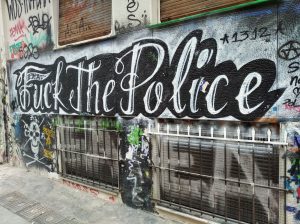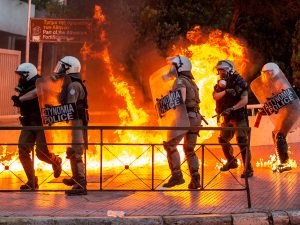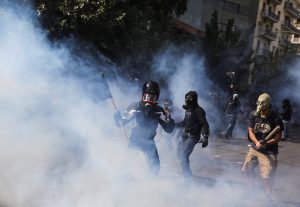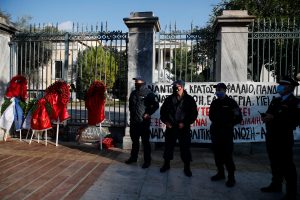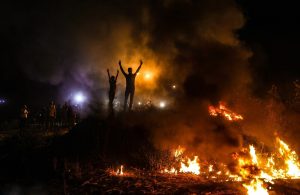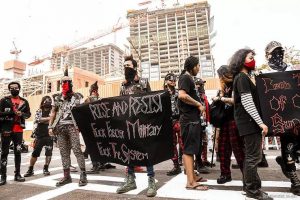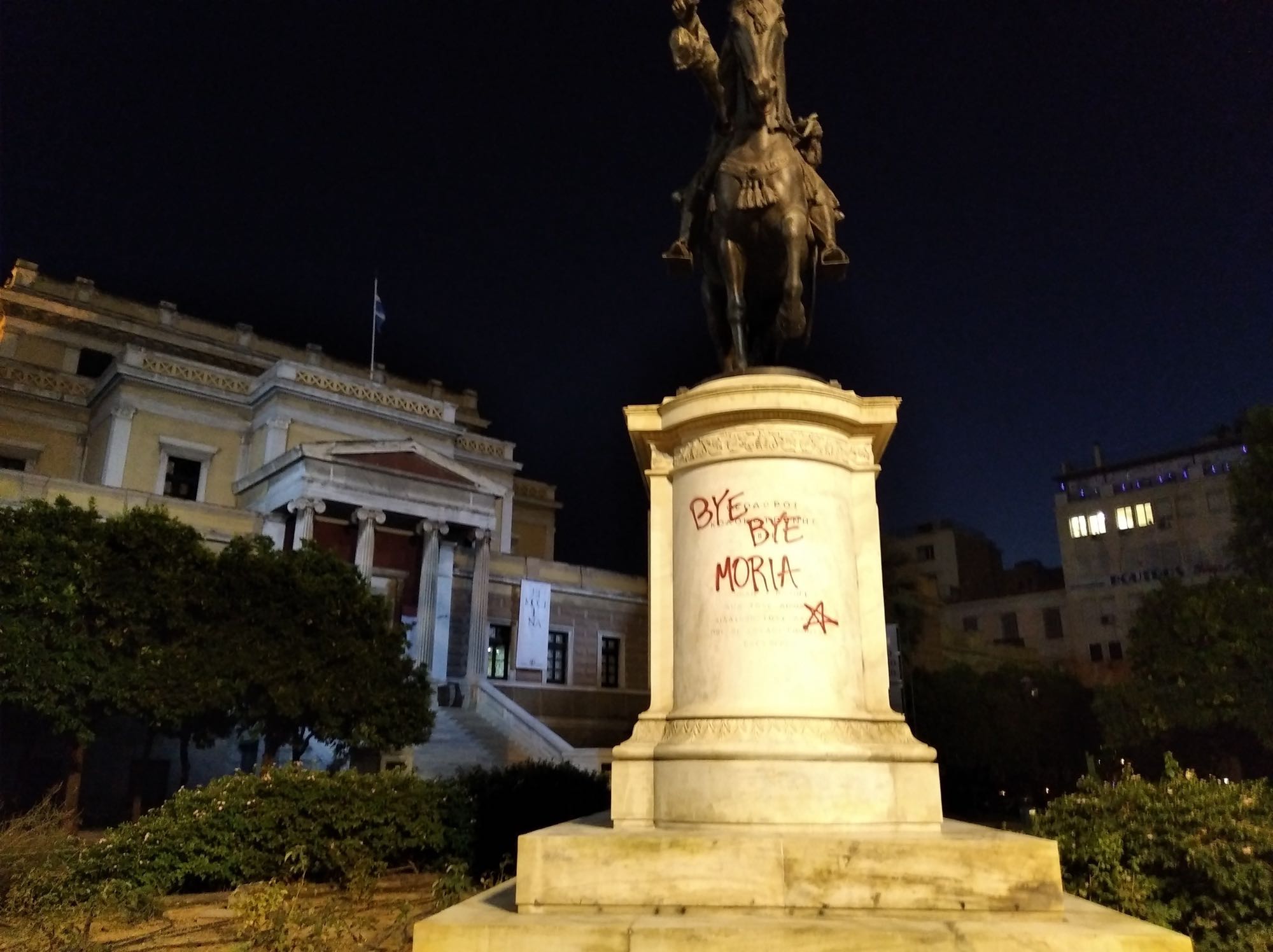
Report on Italiano
In the following report from Greece, anarchists describe the burning of the refugee camp, Moria, and the response countrywide, as well as the latest chapter in other struggles against state repression on a variety of fronts.
This update is adapted from RadioFragmata’s monthly contribution to the “Bad News Report” podcast. You can also read our reports from May, June, July, and August.
Another month, another report on the situation here in Greece. There has been no pause in the repression of the state, nor any peace for the marginalized and excluded. Another historic squat has been evicted, the economic despair many already face is becoming generalized, society drifts towards the right at the guidance of state and corporate media, and the largest concentration camp housing migrants in all of Europe has been engulfed in flames, displacing thousands.
As in the rest of the world, each morning brings new concerns, new disasters, new forms of precarity. We share the following information in the pursuit of a relentless and borderless solidarity.
-Radio Fragmata, September 2020
Video: Refugees demonstrating after the burning of Moria. “Azadi!” Freedom!
Moria Burns—The Greek State Plays Victim
The refugee camp Moria on the island of Lesvos has burned down.
The state claims this was the result of demonstrations by desperate people inside the camp reacting to new measures the police had opportunistically declared in response to an inevitable and now unavoidable outbreak of COVID-19 inside the camp. Some 35 cases have been made public as of early September; considering the intense overcrowding of the camp, the number should be assumed to be much higher. Some wonder whether nearby fascists took the opportunity to set fires under the cover of the refugees’ protests. It is certain that some of the villagers wanted those fleeing the flames to burn alive, as they pushed those who tried to flee to the nearby village of Mytilene back towards the blaze.
If the government’s claim that the fire started from the demonstrations is correct, we can understand this as an act of desperation on the part of individuals protesting against an unbearable situation. Out of all the concentration camps where refugees are contained on islands near Turkey or out of the view of the public on mainland Greece, Moria is by far the most famous, both for its size and for the severity of the conditions. Moria housed over 13,000 refugees, though it was designed for only around 3000. It is a symbol of the racism and dehumanizing policies of exclusion that comprise the basis of modern Europe.
It was inevitable that COVID-19 would enter Moria. Imposing additional restrictions on the already forcibly isolated and controlled camp brought an already dire situation to the brink. Now thousands are going hungry without shelter, including many children. Facing fascist and police violence, they find themselves in an even worse situation than before.
In some ways, the New Democracy administration has used the Moria camp to claim that the EU has failed Greece in the so-called “refugee crisis” dating back to 2015. At the same time, the administration has used the camp to fan the flames of xenophobia, framing the conditions in the camp and the desperation of those who occupy it as self-inflicted. The state shifts between these narratives according to what is politically expedient.
Fascists and their “patriotic” allies will rally around the fire, blaming those inside the camp, and the state will use the disaster to demand more funding from the European Union. The only positive element of this story is that Moria is gone. Moria couldn’t have gotten any worse. It was a concentration camp. Now the world is paying more attention to a camp that was already infamous for its heinous conditions. While misery is especially visible now in the ruins of Moria, we hope that the former residents will somehow find better conditions and that the international attention this has drawn will deter the Greek state from intensifying the attacks on refugees and immigrants described in our prior reports. Many have survived Moria thanks to grassroots efforts and solidarity campaigns that have nothing to do with the state. The state has channeled much of the funds allocated for refugee support to benefit the civil and business elite and the companies they profit from.
Today, as the corporate media disparages the survivors, homeless refugees are scattered around the edges of the ruins of Moria, with many seen sleeping in cemeteries, one of the few places they can find peace from police and fascists. Riot police have been sent in. State officials intend to deal with this humanitarian and health crisis by imposing “law and order,” encouraging refugees to give up and flee back where they came from or detaining and containing them with police procedures intended to push the situation out of sight rather than improve matters for those who are suffering.
The plight of refugees and immigrants in Greece is dire; refer to our prior reports for information on previous chapters in this struggle. The Lesvos Mutual Aid Network has called for support:
“If you are in need, or if you are interested in supporting us in any way you can contact us by phone: 6948580322 (+Whatsapp) or by e-mail: lesvos_network@protonmail.com.”
The “Other Man Social Kitchen Free Food For Everyone” project has also gone to Lesvos to cook for those displaced by the fire. You can donate to them here.
Anarchists, the excluded, and the exploited must all stand together against the state and Eurocentric racism. When refugee and asylum laws were created in international court in Geneva in 1951 in response to World War II, the state couldn’t have anticipated that these would force Europe, the United States, or the “First World” in general to have to accept those escaping the suffering of the so-called “Third World.” The fascist reaction to these laws exposes the inherent hypocrisy and conditional nature of First World Neoliberal philosophies. Whether New Democracy plays victim or pursues populism via xenophobia, their true position regarding the plight of these desperate people is clear in the statement of Adonis Georgiadis, the minister of development and investment and the vice president of New Democracy, in response to the fire. The refugees should “get up and leave. We did not invite them here, they should leave.”
Resistance from the refugees in Lesvos and solidarity efforts from broader revolutionary movements has become substantial. The situation is developing.
Demonstrations have spontaneously erupted near the capital of Lesvos. Thousands of people took to the streets of Athens on September 11, and various solidarity efforts are occurring across Greece. A local anti-fascist demonstration took place on Lesvos on September 11, only to be brutally attacked and tear gassed by riot police. Nineteen people were arrested, many with injuries. The people of Moria are refusing to forfeit their dignity as they face attacks by fascist locals, an imported brigade of riot police, and threats of deportation and or disappearance. Alleged “humanitarian” efforts by the state have continued with the “law and order” approach, going so far as to prevent the military from distributing food to punish the houseless refugees for making demands and demonstrating. Fascists have acted parallel to police by attacking mutual aid support efforts—smashing the windows of cars bringing aid or threatening and assaulting individuals coming to help the refugees.
Some locals are also fighting some state efforts to build another concentration camp on the island. Some of them do not have a problem with refugees, per se, but rather with the state’s use of the land to build a concentration camp. However, it is hard with so much happening to distinguish the intentions of every actor. Many refugees are not only without resources and support, but also face manipulation by the police and “humanitarian” agencies, potentially forcing many into accepting potential deportation or loss of status as a result of confusion, disinformation, and desperation. While France and Germany have agreed to take some of the minors, European politicians have approached this disaster as a mere political debate rather than the dire situation that it is.
We say “Bye Moria! No more First and Third World!”
For updates on the situation in Lesvos, start here.

Squats
The evictions continue. The most recent target was the historic Rosa Nera squat on the island of Crete.
Rosa Nera was a gigantic squat overlooking the sea in the tourist destination of Chania in Crete. It served as a venue for concerts, educational events, political organizing, and various other activities typical of a revolutionary social center. Occupied for 16 years, it was notorious for its beautiful location and size. The state presumably carried out the eviction in September in order to send a message to the squats still holding ground across Greece. Solidarity demonstrations immediately broke out across Crete, drawing 1500 the day of the eviction. An occupation of City Hall followed, as well as interventions at the local offices of property managers and solidarity demonstrations across the island of Crete and throughout Greece.
Simultaneous solidarity actions for the recently evicted Terra Incognita squat in Thessaloniki have also been occurring, with thousands of people attending rallies across the country for both of these historic squats and all squats evicted since New Democracy called for the liquidation of all occupations following their accession to power in 2019.
Video: Comradres attempting to rebuild Libertatia, a squat burnt by fascists in Thessaloniki.
These squats have served as our movement’s infrastructure. They offer places to organize, but they also function as medical centers, gyms, mutual aid and social resource bases, and martial arts studios. While the assaults of the state are dealing powerful blows, the hearts that gave life to this infrastructure continue beating with revolutionary desire, and the courage that helped to create it remains.
Recently, one of the last remaining squats in Exarchia, K-Vox, was targeted with gunfire. At the beginning of September, someone shot eight bullets into the squat while people were inside; fortunately, they didn’t strike anyone. Those inside reported that they could hear the bullets whizzing by their heads. This occurred shortly after the the vigilante Kyle Rittenhouse murdered two people in Kenosha, Wisconsin. The shooting has not been claimed, but it is reasonable to imagine it could be a local fascist inspired by QANON or 5G or COVID-19 conspiracy theories, as American fascists are influencing the Greek right.

Patriarchy
As a consequence of the influence of the church, misogyny has long been a rarely-questioned norm in Greek society. Sexual assault, abuse, and even femicide have been rampant for years. A movement is emerging to break this silence. The COVID-19 lockdown led to an increase in acknowledged domestic abuse, and the lifting of the restrictions has correlated with a spike in sexual assaults.
A project mapping and tracking instances of rape, assault, and misogyny is online here. We do not encourage using Facebook as a platform, but projects like this are important and should be supported and replicated by whatever means are available.
More and more people are speaking up to break the silence about sexual assault. An employee of a ship attempted to sexually assault a 25-year-old-woman en route to Santorini island for a vacation in front of her daughter. He apologized to the courts and the judge gave him a fine of one thousand euros and released him pending a trial that may or may not happen, depending on whether his case re-enters the spotlight. On the island of Ikaria, some men have been beaten following an attempt to sexually assault a woman. This woman now fears for her safety as police are coming to her investigating the beating, rather than the assault they attempted to perpetrate.
On the television show “Big Brother,” a contestant was heard giggling on a live-stream of the sitcom with his fellow contestants as he states that “I go with one chick every day ‘to empty my pocket,’ (ejaculate) otherwise there is rape.” Neither the sitcom nor the channel flinched until there was public outcry about the incident. The individual who said this has since been removed from the show; however, as occurred in response to Trump’s infamous hot-mic leak, many other misogynists came to his defense, claiming that his reference to rape was a harmless joke, or, as they say in the United States, “locker room talk.” There is no attempt by the powers that be to challenge the normalcy of rape and the patriarchy that persists. Any attempt to appear politically correct is precisely political and nothing more than this.
Another man has been sentenced for tossing gasoline on several women in 2018. The girl who was murdered following a dispute with her cop boyfriend in Trikala last month, described in our last report, has disappeared from the headlines as police endeavor to shape the narrative. Yet women are continuing to speak up, publicizing and doxxing sexual assaulters, and, as mentioned above, some perpetrators have been beaten. Vandalism of Orthodox Christian churches and graffiti and banners against patriarchy and the culture of rape can be seen across the country as well.
In the city of Patras, some people carried out a noteworthy action in response to the sexual assaults and abuse perpetrated by a particular guard still working at the Petrouralli detention center for migrants in Athens. On the night of Monday, August 24, a group attacked a regional asylum office with red paint balls, littering the area with leaflets against the culture of rape by police inside detention centers and spray-painting a slogan across the facade of the building: “Cops and rapists, keep your hands off immigrants!”

Prison and Repression
Costas Sakkas and Giannis Dimitrakis face trial on September 16 for allegedly attempting to expropriate a Piraeus Bank ATM in Thessaloniki. The trial of four comrades arrested during the eviction of the anarchist squat known as Gare in 2017 will continue on September 18. The defendants have passionately declared that they will not compromise or cooperate with the state.
The Greek state continues to implement new pre-trial restrictions, preventing individuals from visiting Exarchia or associating with “political” individuals as pre-trial measures. As mentioned in a prior report, four anarchists arrested on conspiracy charges stand accused of being part of a group allegedly known as “comrades.” The state is claiming that these comrades are responsible for dozens of actions claimed by the anonymous signature “comrades.” These individuals are trying to battle pre-trial restrictions of movement and association. A call for solidarity is online here.
Prison authorities continue to take advantage of COVID-19 to restrict the rights of prisoners, disrupting or halting visitation and furlough and limiting or suspending consultations with lawyers. Food and clothing transport have been severely disrupted. Measures in sanitation and hygiene remain as bad as they were prior to the pandemic. As cited in our prior reports, the virus has only provided an excuse for further punishment of those already facing the daily misery of prison.
The Petrouralli immigrant detention facility in Athens continues to be a nightmare for undocumented prisoners facing deportation. You can read a statement from a prisoner held there regarding the everyday life conditions here.
Actions
As repression intensifies, public demonstrations are legally banned, and squatted social centers are constantly threatened with eviction, revolutionary movements are forced to adapt and take cover in the night.
Since the asylum of universities has been lifted, private security contractors and police have collaborated to supervise university campuses and rid them of the freedom previously enjoyed on Greek campuses. In response, a communiqué claimed responsibility for an arson targeting a car belonging to the company “My Services” on August 24:
“On August 24, we attacked a vehicle belonging to the security company “My Services” that has coordinated security efforts with the police on university grounds. We broke into their car and set it on fire, destroying it completely. This company is one of the largest of its kind and is owned by a well-known mobster named Makris. Regardless of its mafia ties, this does not prevent the state and universities from cooperating with them via a two-million euro per year publicly funded security contract […]
Based on the latest leaks, also the announcements of Chrysochoidis (Minister of Civil Protection), there is a plan by security companies to expand their operations. Plans to increase security on campuses, further collaborate with police in training and supervision, and change existing laws in order to arm security personnel at universities. There is also a proposal to create an electronic card entry system in order to identify people, share information with the state regarding activity on campuses, and further suppress the presence of revolutionary activity and organizing at universities.”
-Anarchists
A vehicle belonging to a Turkish diplomat was set ablaze in Thessaloniki in the early hours of Thursday, August 27. The action occurred in a neighborhood that houses multiple foreign embassies, communicating a will to strike regardless of the immense security obstacles in such an area. The action was declared to be in solidarity with Ebru Timtik, who passed away inside one of Recep Tayyip Erdoğan’s prisons after a 238-day hunger strike. A communiqué for the action also expressed solidarity with the Terra Incognita squat. Its release appears to have been timed to coincide with the international days of solidarity with political prisoners the Anarchist Black Cross announced for August 23-28.
From the communiqué:
“We take responsibility for the arson of a diplomatic vehicle on Ioanni Varvaki Street in Thessaloniki, in the early hours of Thursday, August 27. We call on all the world of struggle to turn the call of International Solidarity with political prisoners into a fiery flame of aggression, that will unite our struggles of rebellion across the earth. In light of this call, we took this action in response to the murder of another hunger striker by the fascist state of Erdoğan in Turkey. Ebru Timtik passed away on August 27, after 238 days of a hunger strike, demanding a fair trial.
Every step of state repression is a call for war.
Every loss is an occasion for new waves of attack.
Solidarity with the occupation of Terra Incognita and those who fight to the end against injustice.”
-Angry squats
Late in the night on August 30, the personal car of Stefanos Tsonakidis, a well-known fascist in Patras, was destroyed by arson while it was parked in front of his home. Stefanos used to be a member of the fascist group Golden Dawn, and has now joined an even more fascistic splinter group of Golden Dawn created by notorious Neo-Nazi Ilias Kasidiaris. This action was claimed by “Anti-Fascist Action,” sending a message that there is no safe space for fascism in Greece.

Exarchia and Public Space
Little has changed in Exarchia since our last report. Police continue to run rampant in the streets, harassing women, anyone with brown skin, and those who look “alternative” or queer—though with the end of the summer, the return of people to the streets as businesses re-open has hindered some of this harassment and abuse. Delta and riot police attacks continue on any organizing in public space for non-business reasons or in order to benefit the movement. One sees more police in uniform in Exarchia than anywhere else in the city. Fortunately, Airbnb has taken a big hit from COVID-19, though business owners and real estate developers are betting on a big boom after the pandemic eases. Unfortunately, this means that foreign businessmen and local elites have maintained their property holdings in the center of Athens as long term assets, continuing to charge absurdly high rents that do not reflect local wages.
In the context of the ongoing struggle for control of Exarchia, it’s worth reporting a case in which one person faced and won a trial.
Elias Gionis is a local artist and queer activist. Before the formal police occupation, which intensified during the COVID-19 lockdown, it was mafia and drug dealers harassing woman and LGBTQ people. Now that many of them have moved elsewhere or become more discreet in collaboration with the police, the police have taken their place. In fact, police were the first ones to push drug dealers and addicts into Exarchia in order to discredit the neighborhood’s reputation as a police-free zone.
Elias Gionis was walking around Exarchia when Delta police harassed him. Elias responded, verbally defending himself. Being used to silence in response to their threats, as many residing in Exarchia live in fear of their state-sanctioned beatings and arrests, the Delta police arrested him. He faced trial and the risk of prison time simply for verbally defending himself against their homophobic abuse. Fortunately, the charges were dropped in early September.
A statement from Elias:
“The police are arbitrary against the citizens because they have the freedom to be. When you are attacked by a citizen, you are taught to call the police to protect you. When the police attack you, then they charge you to protect yourself. What would happen if I was not a well-known activist, if I was a weak child without a lawyer, without financial ability, and without a family to support me, especially if I was someone who did not have a family that supported me knowing I was gay? Just as we hear every day that a homosexual has been attacked, we must begin to hear that a police officer has heard a response. To give strength to the other children who may have once been wronged or to know how to react, if it happens to them in the future.”
You can read more about Elias’s case here.

Nature
As mentioned in prior reports, environmental conflicts are escalating as the government seeks to make up for the loss of tourist money. In the region of Pelion, the state has began expanding its attempts to take control of water supplies in the biologically diverse mountain region. In concert with other community assemblies in the region, such as the one in Stagiates, the village of Drakia has established a popular assembly to stop the privatization and exploitation of natural water sources. Villagers have blocked developers from the DEYAMB group, which maintains water and sewage systems serving the nearby city of Volos. DEYAMNB plans to bring in police; many anticipate a long-term struggle like the one seen in nearby Stagiates. Popular assemblies in villages across the region have given broader strength to a movement to defend the land against developers and business elites.
Meanwhile, the struggle against industrial trash burning continues in Volos, with a large banner action against the plant. There are also protests against the development of wind turbines, with blockades set up on the island of Tinos. The state has stationed police in villages and on islands to counter popular resistance, in order to halt traffic to escort industrial machinery or to lock down entire regions for the sake of destroying mountaintops before any resistance can emerge.
https://twitter.com/AnarchyPressgr/status/1305024331622350848
As on the West Coast of the United States, fires also continue to blaze, likely caused by a combination of climate change and Greek developers seeking to evade regulations governing building structures. Regardless of who is responsible, capitalism is at the root of these disasters. As the climate crisis worsens, we can expect an increase in tragic ecological events—and hopefully a parallel growth of resistance to them.

The Anniversary of Pavlos Fyssas’s Murder
September 18 marks seven years since Neo-Nazis from Golden Dawn murdered anti-fascist musician Pavlos Fyssas. Since then, the only justice we have seen addressing his murder was the anonymous killing of two fascist members of Golden Dawn and the broader street movement of anti-fascist resistance. The state continues to play games in their courts, shifting the urgency of the prosecution according to media attention. However, a verdict is expected on October 7.
Fascists have gotten on the bandwagon of global conspiracy theories. Golden Dawn and other Greek Neo-Nazi groups have been challenging COVID-19 restrictions, spreading nonsense about 5G, and taking other cues from their American and German counterparts. Scuffles are taking place in the streets. On the other side, anti-fascists found the leader of Golden Dawn and attacked him with water bottles while he was vacationing. As the administration escalates repression, we expect a much more intense future of fighting the efforts of fascists in Greece.


The Delivery Union
The Greek delivery union has been specifically attacked for organizing events. Wolt and E-food, Greek versions of Seamless or Uber Eats have made inroads into the country. This is a sign of further automation in Greece, a consequence of the “modernization” of the Greek economy. The gig economy is not widely understood here yet, but apps such as BEAT (Greek Uber for taxis) and Airbnb have set precedents for its expansion. These services will complicate the lives of delivery workers; it is much harder to confront an invisible boss when a worker has been wronged.
Oil Exploration and Military Games
While the economy has shrunk exponentially due to measures to control COVID-19, the Greek state was able to to find 2.5 billion euros to ramp up its military in response to the recent conflict in the Mediterranean. As cited in past reports, the heads of state of Turkey and Greece are both taking advantage of the heightened tensions around oil drilling in the Mediterranean. Turkey is sending oil exploration ships into the Aegean Sea, which Greece claims is a violation of national sovereignty. Both countries are using this conflict over natural resources and maritime claims to fan the flames of national pride rooted in militaristic goals. Regardless of who is in the right according to international law, it is obvious why the rhetoric is escalating at a time when distractions are needed, as the reality of the post-pandemic economy in both countries sets in.
With that said, if the deal goes through that is planned by Greece, Cyprus, and Israel to drill in the Mediterranean and create a pipeline under the sea into mainland Greece and onward to Europe, it will without a doubt lead to deadly environmental disasters and social displacement. This situation will have disastrous effects on the people and land around the Aegean sea.

Conclusion
As all this is unfolding, many people are fighting for the relief of their electrical bills and simply to keep their homes. The anarchist movement of Greece is facing a modernizing repression. “Quality of life” policing and a new status quo similar to the social control seen in northern Europe and the United States are both making their way to Greece as the authorities seek to reinvent a “Europeanized” Balkans.
The situation is bleak. However, our hearts are still here. Our bodies are still here. Our passion and desire remain, awaiting the next wave of insurrection. It is only a matter of time.
May the torch of insurrection and resistance be passed across the world through our borderless solidarity.


